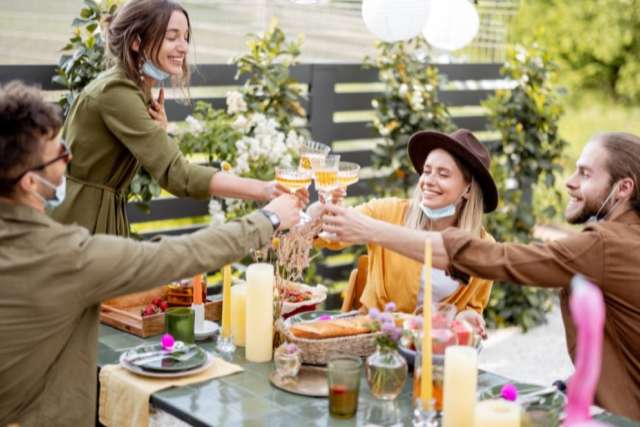During the past two years, however, the holidays heralded a surge in infections, as social events and cooler weather brought people into closer contact indoors.
One change this year is the new “bivalent” booster. Everyone age 5 and older who has received a primary vaccine series is eligible to receive the new booster that targets the now-dominant omicron variant.
“Immunity after vaccination wanes over time and the dominant SARS-CoV-2 strains have evolved. It’s important to get an updated booster so that your immune system is ready to fight the new variants,” says Annabelle de St. Maurice, MD, MPH, co-chief infection prevention officer at UCLA Health. “The safest thing to do is to make sure everyone at your gathering is vaccinated and boosted. Those over 5 years of age should also receive the bivalent booster.”
Consider these expert tips to keep your holiday get-togethers as safe as possible:
Get your booster: People are eligible to receive the booster if it has been at least two months since their most recent shot or three months after COVID-19 infection. It’s a good idea to get a flu shot as well, experts say, since a potentially severe flu season is expected this winter.

Take extra precautions for immunocompromised guests: Elderly people and individuals being treated for certain medical conditions, such as cancer or organ transplant, may not mount as robust an immune response to vaccination, so extra care is warranted, Dr. de St. Maurice says.
Keep your gathering space uncrowded, ensure ample air flow in the room or consider moving the party outside. Using well-fitted masks with high filtration indoors may also be a good idea. And check to make sure guests are vaccinated and boosted – it takes two weeks after a shot for immunity to fully develop.
“Transmission can occur from fully vaccinated people, but it reduces the risk substantially if everyone is vaccinated and boosted,” Dr. de St. Maurice says.
Test before you go: It may be wise to take a rapid COVID-19 test before your holiday gathering to see if you may be infected and asymptomatic. And if you do have symptoms — sore throat, stuffy nose, fatigue, headache, fever — stay home, even if you receive negative results on a rapid test.
"Transmission can occur from fully vaccinated people, but it reduces the risk substantially if everyone is vaccinated and boosted."
Dr. annabelle de st. maurice, co-chief infection prevention officer at ucla health
Even if all guests test negative, however, it’s important to incorporate other safe practices in any room where people from various households are gathering, such as avoiding crowding and increasing air flow, Dr. de St. Maurice says.
Wear a mask while traveling: If you’ll be flying or taking other public transportation to your holiday destination, wear a mask. N95 and KN95 masks are designed to trap aerosolized particles, including those carrying COVID-19.
“Although airlines are no longer requiring masks to travel, I recommend wearing a mask,” Dr. de St. Maurice says. “Planes and airports may be crowded and lots of viruses including flu, RSV (respiratory syncytial virus) and SARS-CoV-2 are circulating.”
While Los Angeles County health rules no longer require masks to be worn aboard public transportation or in airports and bus terminals, they remain strongly recommended.
Get the most up-to-date information about COVID-19 and vaccines.




